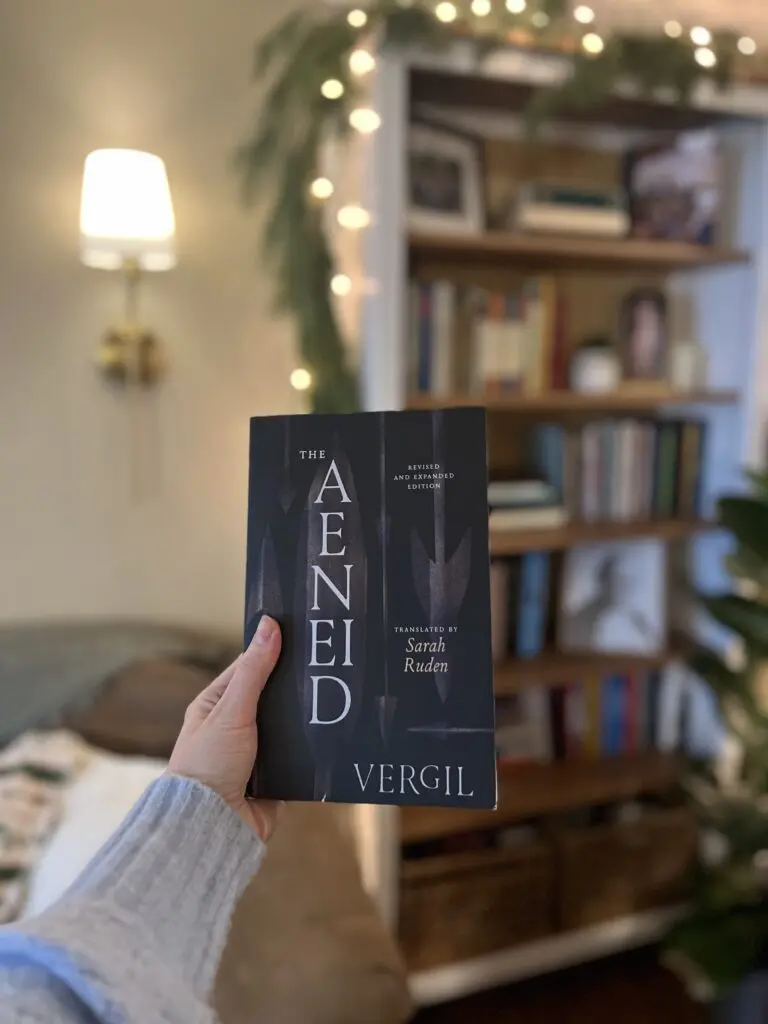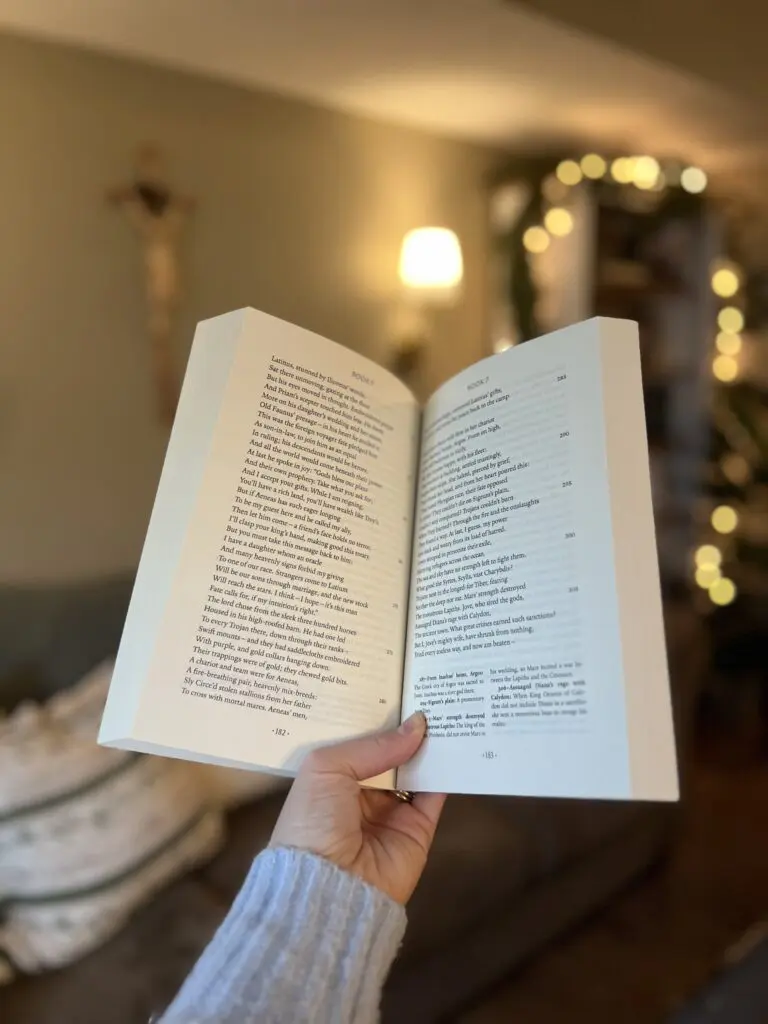The Restoration of Culture Through Literature and Prayer
Written by Christina Mermis
In an essay entitled “The Importance of Virgil”, my favorite author and educational reformer, John Senior, wrote, “If I succeed in giving anyone even the slightest glimpse into the rich treasure of Virgil, I shall have made my case for the restoration of education.”
I know I am not coming anywhere close to fully understanding this great epic. Still, I’ve caught a slight glimpse into its rich treasure. With the help of Well-Read Mom, we are carrying on this important work of restoring education: Our education. While most of us probably didn’t receive a classical education like the one Senior bravely gave to his students in his Integrated Humanities Program at Kansas University in the 1970s, we can fight for it now. It is our inheritance.
Educational reform is nothing less than the restoration of culture. Western civilization, our heritage, went to school in Virgil. The crisis in the West today, says Senior, “is in very large part the consequence of the fact that a determinate number no longer knows Virgil.”
He goes on to explain:
The sociologists say that a certain number—it varies according to the circumstances, sometimes quite a small number—determines society, sets the standards, raises the taste, fixes the fashions, strikes the tone in music, art, and literature. When a determinant number has been brought up on Virgil, you have civilization… If Virgil had not written the Aeneid, we would be savages by now.
We can be a part of that ‘determinate number’. We can educate ourselves in the classics of our Western culture. We can show our children that immersing ourselves, at any age or stage of life, in culture—true culture; the best that has been thought and said, in Matthew Arnold’s happy phrase—is worthwhile for us and all of civilization.
The hand that rocks the cradle rules the world. Although ours is primarily a hidden vocation, mothers are uniquely positioned to “set standards, raise the taste, strike the tone in music, art, and literature” in our family. The family is the building block of society. This work is slow, hidden, mysterious, and exponential, like the mustard seed. Looking at a giant tree, no one can understand how it came from the smallest seeds. The mustard seed is, of course, a sign of the Kingdom of God; this is the way God works. We shouldn’t be surprised that what we as mothers decide to listen to, watch, and read in our homes will mysteriously shape culture.

In his book, The Restoration of Christian Culture, John Senior says that if this seed is to grow, we must restore the cultural soil, for it will only grow in “an imaginative ground saturated with fables, fairy tales, stories, rhymes, romances, adventures—the thousand good books… Western tradition, taking all that was best of the Greco-Roman world into itself, has given us a culture in which the Faith properly grows; and since the conversion of Constantine that culture has become Christian. It is the seedbed of intelligence and will, the ground for all studies in the arts and sciences, including theology, without which they are inhumane and destructive… Anyone working in any art or science, whether ‘pure’ or ‘practical’, will discover he has made a quantum leap when he gets even a small amount of cultural ground under him; he will grow like an undernourished plant suddenly fertilized and watered.”
Saturating our homes, our lives, and our children’s childhoods with good books is the restoration of Christian culture. But these must be truly good books, classics, which are easily identifiable because a classic is something everyone knows, for it has stood the test of time. Note, too, that Senior recommends the thousand good books—not the hundred Great Books. Countless good books are enjoyable, accessible, and lovely for all ages.
As John Senior wrote, “Virgil is a traditionalist, but do not mistake that word. Nothing could be further from tradition than stagnation, as some might think. One easy way to stagnate, in fact, is to live for the present alone; nothing is so dated as the latest thing. The newspapers, the magazines, the television shows, these give you the sorry chronicle of all that is dead about a culture; they rub off the epidermis, they give you the nail and hair clippings…”
By reading classic literature, we enter into tradition. We stand in direct opposition to the world that tells us the most important thing is staying up to date on current events and politics, a world that tells mothers they should be reading celebrities’ trendy children’s books and bestsellers. The world knows these will stagnate us and keep us from our full, God-given potential. I’m so thankful to Well-Read Mom for helping me break the shackles of confinement to only that which is current. You can keep your shiny bestseller that no one will remember in twenty years. I’ll read Virgil, Shakespeare, Chesterton, and Pinocchio; I’ll read Aesop, Mother Goose, Grimms, Beatrix Potter, Tolkien, and Lewis to my children.

I have my teenagers read the Aeneid during their freshman year in our classical homeschool, and I see its effects, one of which could only be described as philosophic happiness. Unlike many teenagers in America today, my sons can sit with long, ancient, epic poetry, reflect on it, and compare it with other works of literature. It is slow, sometimes difficult, work that teaches patience and humility, ultimately leading to contemplation, which is the ground for encountering God. Don’t I deserve this too? As a mother, I strive to give this gift of education to my children. Shouldn’t I receive it, too? Finally, after 3 years of teaching high school, I am opening the Aeneid myself and entering into it.
I’m in good company when I say that the ability to sit with a good book and enter into its meaning develops our habit of attention (Mason) and that attention is the key to contemplation and prayer (Montessori). The French mystic and philosopher Simone Weil brilliantly synthesizes these two points in her essay Reflections on the Right Use of School Studies with a View to the Love of God. She says, “The key to a Christian conception of studies is the realization that prayer consists of attention. It is the orientation of all the attention of which the soul is capable toward God. The quality of the attention counts for much in the quality of prayer. Warmth of heart cannot make up for it. The highest part of the attention only makes contact with God when prayer is intense and pure enough for such a contact to be established, but the whole attention is turned to God.”
Ultimately, reading Virgil is developing my power of attention. It doesn’t really matter much whether I succeed in understanding it. Weil says, “Never in any case whatever is a genuine effort of the attention wasted. It always has its effect on the spiritual plane and, in consequence on the lower one of the intelligence, for all spiritual light lightens the mind.” If at the end of an hour of reading the Aeneid, I am no closer to really understanding it than I was when I started, I “have nevertheless been making progress each minute of that hour in another more mysterious dimension. Without (my) knowing it or feeling it, this apparently barren effort has brought more light into (my) soul. The result will one day be discovered in prayer.”
Prayer, the lifting up of our souls to God, consists of attention. And perhaps this is why reading literature will restore our culture, one mother at a time.

About Christina Mermis
Christina Mermis and her husband are raising their seven children high in the mountains of Colorado. Her favorite place is in a book. She loves learning about her faith, classical education, and literature. Her passion is to integrate these into the fabric of her homeschool and domestic church and to walk alongside her children in the search for truth, goodness, and beauty.
About Well-Read Mom
In Well-Read Mom, women read more and read well. Our hope is to deepen the awareness of meaning hidden in each woman’s daily life. We long to elevate the cultural conversation and revitalize reading literature from books. If you would like us to help you select worthy reading material, we invite you to join and read along. We are better together! For information on how to start or join a Well-Read Mom group visit our website wellreadmom.com

